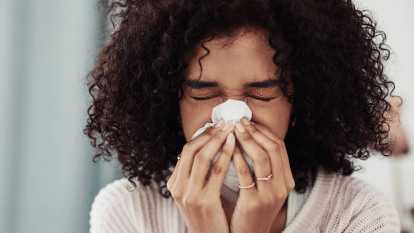3 Simple Ways to Keep Your Blood Pressure Under Control

Staggeringly, almost half of women struggle with high blood pressure, according to the Centers for Disease Control and Prevention. And a recent study published in the European Journal of Preventative Cardiology found that women in their early 40s with even mild hypertension — a top number between 130 and 139 mm Hg and a bottom number between 80 and 89 mm Hg — have more than double the risk of heart disease as men of the same age, with the same numbers.
The good news? “For most women, it doesn’t take much to get blood pressure down into a healthier range,” promises Nieca Goldberg, MD, Medical Director of the Women’s Heart Program at NYU Langone Medical Center in New York City. Simple strategies can lower your blood pressure and make you feel happier to boot. Here, fast, fun doctor-recommended tactics to lower your blood pressure naturally.
First Thing: Marvel at the New Day
The secret to keeping blood sugar within normal levels? Take an AM stroll around the neighborhood. In a small study of postmenopausal women published in the journal Hypertension, those who got 30 minutes of exercise in the morning and took brief walking breaks throughout the day experienced a drop in blood pressure comparable to that provided by prescription medications. One reason for this dramatic result may be that morning exercise helps counter the normal rise in blood pressure that occurs throughout the day,” explains Kathryn Boling, MD, a family medicine specialist at Mercy Medical Center in Baltimore, Maryland.
And sprinkling in walking breaks, by standing up and strolling around for three minutes every half hour — a move that helped study subjects knock two points off their blood pressure — may prevent blood pressure from steadily increasing as the day wears on. To help you remember to get up, set a timer for every 30 minutes, or use a free app like Stand Up! The Work Break Timer.
Throughout the Day: Don’t Wait to Exhale
Anytime you feel frazzled during the day, be it navigating rush hour traffic or rushing to finish a project, simply take a few deep breaths. “This easy activity that works so well to lower blood pressure because it decreases levels of stress hormones in your body,” explains Dr. Goldberg. In fact, a recent Harvard study found that people who practiced relaxation techniques such as deep breathing for up to 20 minutes a day were able to lower their blood pressure to a point where they no longer needed medication!
The reason? When we’re stressed or anxious, our breathing becomes shallower, triggering the release of stress hormones and dialing up blood pressure. But simply prompting ourselves to breathe more deeply — especially on the exhale — activates the parasympathetic nervous system, triggering a relaxation response that instantly lowers blood pressure. To do, try equal breathing, suggests Dr. Goldberg. Simply inhale through your nose for a count of four, and exhale for four. Over time, you can go up to eight breaths in, eight out. You can also download a relafxation app on your phone: Dr. Goldberg likes Smiling Mind, a free app that offers short daily meditation and mindfulness exercises.
At Night: Treat Yourself to a Long Soak
Want another reason to slip into a warm bath with a good book at the end of the day? A new Japanese study that followed over 30,000 people over 20 years found that folks who took a daily hot bath slashed their risk of heart disease by 28 percent and risk of stroke by 26 percent. “One theory is that the heat from the bath dilates blood vessels, lowering blood pressure,” explains Dr. Goldberg. “A warm bath also relaxes you, which helps lower stress hormones in your body, which will also decrease blood pressure.”
The only caveat: Check with your doctor first if you take blood pressure medication, she notes, because a warm soak may cause your blood pressure to dip so low that you feel dizzy or lightheaded. Otherwise, dim the lights, turn on some soft, soothing music, and settle in, ideally submerging your shoulders — the more surface area of your skin the water covers, the bigger the heart benefits. For best results, schedule your soak for 90 minutes before bed: A recent study in Sleep Medicine Reviews found that this simple timing trick helps you nod off more quickly by lowering your body’s core temperature and priming you for sleep.
A version of this article originally appeared in our print magazine, First for Women.













